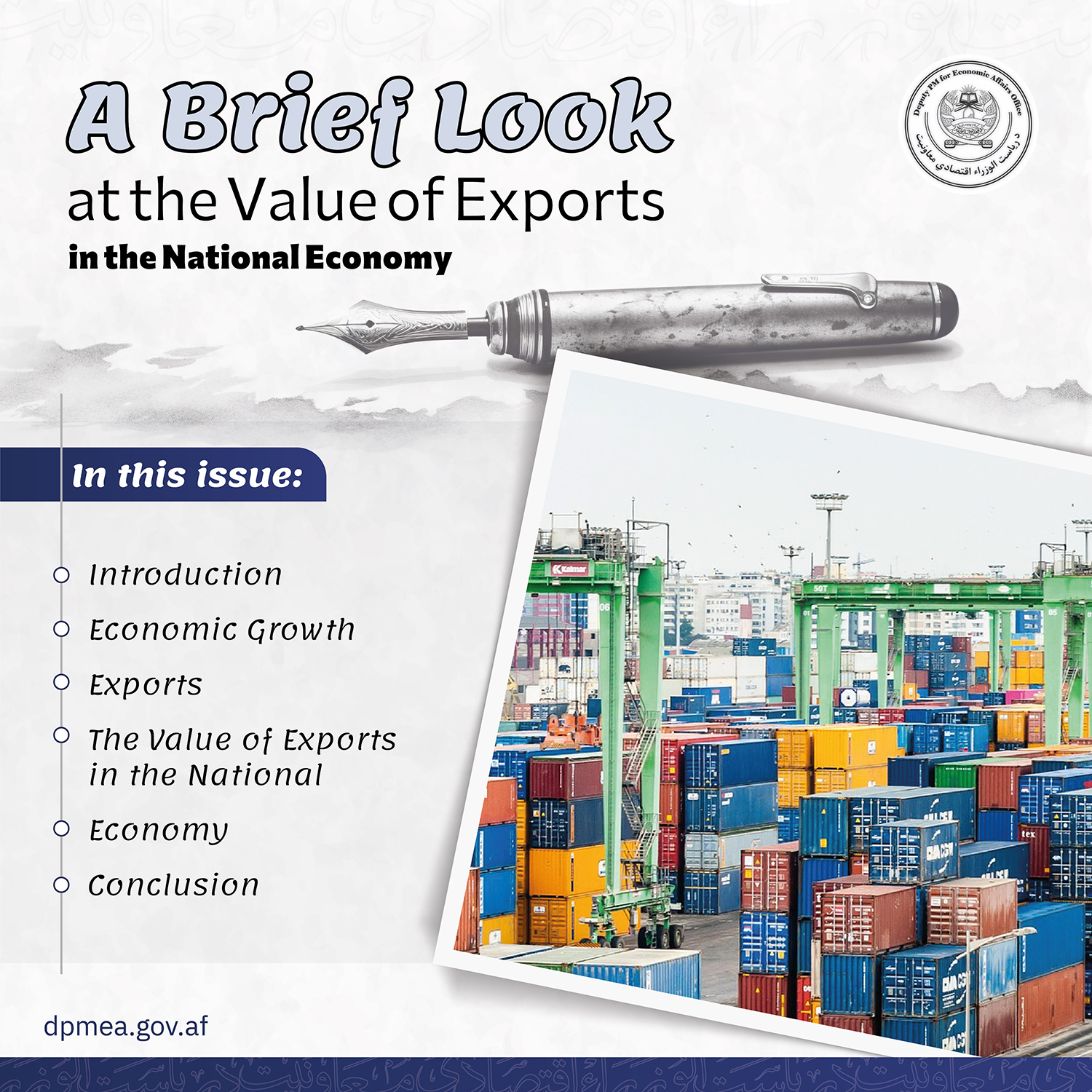A Brief Look at the Value of Exports in the National Economy

Author: Amanullah Hanifi
Translator: Sajad Ahmad
Introduction
The most important aspect of a nation's economy is based on trade, and as such, governments prioritize the development of commerce and the creation of all necessary facilities in this sector more than in other areas. All countries establish trade relations with other nations to meet their relative needs, and these relationships are solidified through the export and import of produced goods.
Countries around the world strive to focus more on exports within the trade sector to accelerate their economic growth. This is because exports significantly fulfill domestic needs at lower costs, attract foreign investment, boost domestic industries, and create numerous job opportunities for the population.
In this article, we will briefly discuss the significance of exports in the economic growth of a country.
Economic Growth
Economic growth reflects a country's level of production. When we talk about economic growth, our entire focus shifts to a nation's output. The most crucial and fundamental path to achieving economic growth and accelerating this process lies in the quantity and capacity of domestic production. In other words, when the Gross Domestic Product (GDP) increases, we understand that economic growth is improving. Economic growth is measured based on the Gross National Product (GNP) and GDP, indicating an increase in production within a country.
As domestic production increases and essential facilities are established, economic growth can accelerate, which in turn directly impacts the lives of the general population.
Exports
Exports essentially refer to the shipment of goods from the place of origin to their designated location. Exports can be defined as the movement of food items, medicines, industrial products, agricultural products, and various goods within a country or abroad in accordance with existing laws and regulations. Exports means the production and arrangement of goods and products in one country and its selling to consumers in another country. Exports, along with imports, create international trade. In other words, exports are a vital part of international trade, balancing a country's trade along with imports. Exports facilitate international commerce and play a crucial role in generating employment opportunities, increasing production and profits, and accelerating domestic economic activities.
Exports are critical for a country's economic growth because they introduce products to more consumers and markets. Today, an essential aspect of foreign policy among countries is the expansion of trade relations and the encouragement of exports and imports.
The Value of Exports in the National Economy
In many countries, the advancement of exports is the main driver of economic growth, and creating and strongly supporting facilities in this sector leads to an increase in exports. Countries with a significant presence and role in international markets, especially in trade exchanges, tend to have more exports. Countries that produce more goods than they need and send the surplus to foreign markets achieve balanced trade and simultaneously gain the commercial trust of various parties. The main advantage of accessing multiple trade markets is that if one market slows down, the needs can be met from another market, preventing negative impacts on purchasing power.
Balanced trade maintains a balance between exports and imports simultaneously, representing a stable economy. When the balance between exports and imports is disrupted, a significant deficit arises in the country's trade, posing a major obstacle to economic growth. Exports play a crucial role in creating this balance.
Domestic production and presenting it to international competitive markets grant countries economic independence. The products produced by a country in international markets are considered key factors in economic growth. Accurate identification of a country's major export goods can help increase exports significantly. For example, in Afghanistan, dried and fresh fruits, saffron, and Afghan carpets have a strong market globally. If the exports of these goods increase, undoubtedly, Afghanistan will strengthen trade relations with many countries, leading to economic growth.
If the exports of these goods increase, it is certain that Afghanistan will strengthen its trade relations with many countries, resulting in economic growth. With the expansion of exports, domestic producers reduce their production costs by increasing output, thereby gaining more profit in the international market. The better a country's position in international markets through exports, the greater the opportunities to attract foreign investment. Increased exports allow a country to move beyond traditional stages of industry and production, benefiting from the experiences of other countries during export processes, and fostering industrial and social change within the country.
As exports increase, many job opportunities are created, engaging various sectors of society in employment and raising the per capita annual income. The higher the per capita income in a society, the better the standard of living, which in turn plays an important role in accelerating economic growth.
In summary, exports play the most crucial role in a country's economic growth. Additionally, they positively impact the creation of job opportunities and the balance of trade. For a country to achieve rapid economic growth, its exports must exceed imports in the trade balance.
Conclusion
In today's world, every country meets its needs through trade. The broader and more extensive the scope of trade, the more easily and cost-effectively a country can acquire the goods it requires. Trade, comprising both exports and imports, plays a crucial role in a nation's economic development, with exports being particularly significant.
Through substantial exports, a country can capture a larger share of the international market, increase domestic production levels, reduce the costs of its produced goods, create new employment opportunities, eliminate existing trade deficits, and achieve balanced trade.
In the modern world, exports drive the economic growth wheel of countries. The greater and higher the quality of a nation's exports, the stronger its competitive power on the global stage. Today, the best strategy for capturing international trade markets and expanding commercial relationships is through exports.